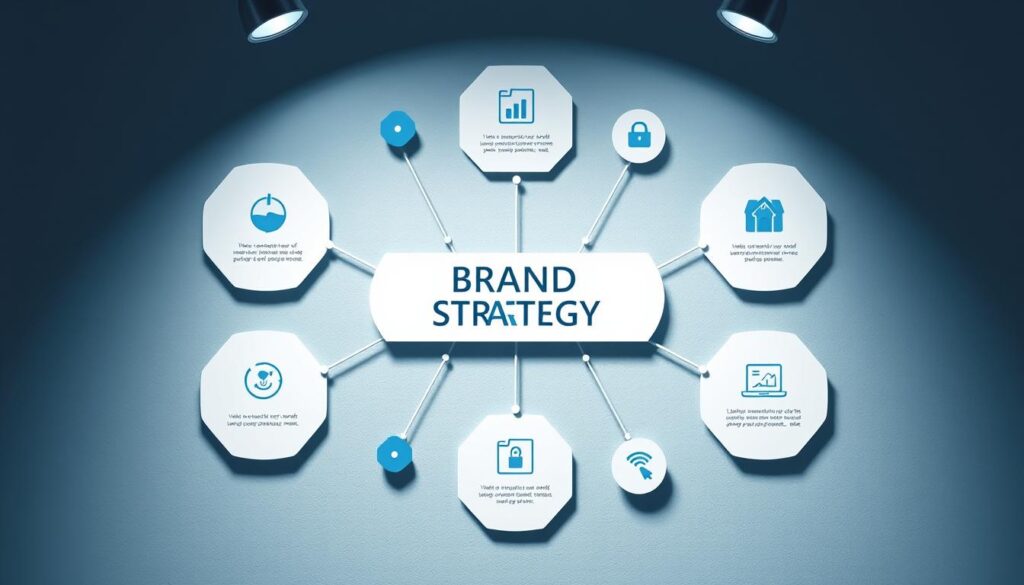Creating a brand identity for your startup is key to success in today’s market. A strong brand identity is the core of good marketing. It helps you stand out in a crowded field. Your brand’s look, name, message, colours, and typeface all play a part.
These elements help people remember you quickly. This is a big plus for new businesses. Sadly, many startups fail without a strong brand, with up to 90% not making it past five years.
So, spending time on your brand’s identity is not just creative. It’s essential for building trust and emotional connections. This can help your startup succeed in the long run. For more on choosing a great name, check out this essential guide.
Table of Contents
Key Takeaways
- Creating a memorable brand identity is vital for startup success.
- A cohesive brand identity enhances marketing effectiveness.
- Clear and positive brand names boost customer attraction.
- Effective brand identity can reduce the risk of failure significantly.
- Investing in visual elements strengthens brand recognition.
Understanding the Importance of Brand Identity
Creating a strong brand identity is key for startups today. With over 300,000 new businesses every quarter, it’s vital to stand out. A clear brand identity helps you be recognised and builds loyalty, which are key for success.
Differentiating Your Startup in a Competitive Market
The market is full of competition for new businesses. A strong brand identity is essential to be noticed. It lets you find a unique spot in the market, making it easier for people to see what you offer.
When people can spot your brand, they’re more likely to choose you. This is a big advantage in a crowded market.
Establishing Trust with Your Audience
Trust is key for attracting customers, even more so in B2B. A professional brand identity builds confidence. A good logo, consistent messages, and quality content show what you’re about.
Studies show a strong brand identity helps you stay focused and loyal customers. This sets your business up for long-term growth.
Your brand needs to keep evolving. Look at customer satisfaction and market share to see how you’re doing. Listening to customer feedback helps you improve your brand and stay relevant.
| Brand Identity Element | Importance |
|---|---|
| Logo Design | Enhances recognition and establishes professionalism |
| Consistent Messaging | Builds trust and reinforces brand values |
| Visual Identity | Creates a memorable impression and fosters customer loyalty |
For more on brand identity and its role in your startup, check out this guide on brand identity.
Building a Brand Identity for Your Startup
Creating a strong brand identity means knowing what makes your startup special. This is your unique value proposition (UVP). It’s what sets you apart from others in the market.
To make a great UVP, think about what makes your product or service unique. Is it new technology, top-notch customer service, or solving big problems in new ways?
Crafting Your Unique Value Proposition
Your UVP should tell people why your startup is important. Learn about your customers and what they need and want. This way, you can make a story that speaks to them.
Aligning Your Brand Values with Customer Expectations
Brand values are key to your identity. Choose values like being green, open, or innovative. These values add depth to your brand.
When you match your values with what customers want, you build trust and loyalty. By staying consistent in your brand identity, you make a strong mark in the market.
Creating a Strong Brand Strategy
Building a solid brand strategy is key for any startup wanting to stand out. A clear brand strategy guides your marketing and helps you connect with your audience. Knowing what they like and need is the first step to success.
Identifying Your Target Audience
Getting to know your audience means doing deep market research. This helps you understand who they are and what they want. By focusing on these details, you can build a brand that truly speaks to them.
Understanding Market Positioning
Your startup’s place in the market is how others see you compared to rivals. Being clear about this lets you show off what makes you special. Good market positioning means your message matches what customers expect, making your brand stand out.
For more tips on building a strong brand, check out this resource. It offers practical advice on making your brand unforgettable.
Developing Visual Elements of Your Brand
Creating compelling visual elements is key to a strong brand presence. Your brand logo is vital for recognition. It should capture your brand’s essence and make a lasting first impression.
It must be simple yet versatile, shining across different platforms.
Importance of Logo Design in Brand Recognition
A good logo design is the heart of your visual identity. Companies like Apple and Nike show how a memorable logo builds loyalty. Your logo should be sharp and unique, linking easily to your products or services.
Choosing the Right Colour Palette and Typography
Colours and typography reveal your brand’s personality and values. Colours can stir emotions and shape perceptions. For instance, blue is often seen as trustworthy, fitting well with financial brands.
Typography also shapes your brand’s image. Picking fonts that match your brand’s character is key to cohesive branding.
Creating a Cohesive Visual Identity
Creating a unified visual identity is critical. All brand elements, from logos to colours and fonts, must align. This consistency boosts brand recognition and ensures a smooth experience for your audience.
Establishing Effective Brand Messaging
Crafting compelling brand messaging is key for any startup. Show your mission and values clearly. This helps connect with your audience.
Your origin story is a big part of this. It gives a personal look into your entrepreneurial journey. This story engages people by showing why you started your business.
When you share your origin story, it makes your brand more real. This lets customers connect with your brand on a deeper level.
Crafting Your Startup’s Origin Story
Your origin story is the heart of your brand. It explains why your startup exists and what inspired it. An effective story will speak to your target market.
It shows the challenges you faced and the solutions you offer. By sharing personal experiences, your story sets you apart from others. This builds a strong emotional bond with your audience, leading to loyalty and trust.
Choosing the Right Tone of Voice
The tone of voice in your brand messaging is very important. It shows your brand’s personality and how customers see you. You might choose a playful, authoritative, or supportive tone.
Being consistent with your tone across all channels is key. A clear tone of voice makes your brand more recognizable and strengthens your values. When your messaging matches your tone, it grabs your audience’s attention and builds stronger relationships, making your brand unforgettable.
Ensuring Consistency Across Brand Touchpoints
Building a memorable brand is key. To do this, creating brand guidelines is vital. These guidelines help keep your brand look and feel the same everywhere.
They cover things like logos, colours, fonts, and how to talk about your brand. This ensures your brand looks and feels the same to everyone.
Creating Brand Guidelines for Internal Use
Brand guidelines make your branding efforts easier. They give clear rules for how to show your brand. This means everyone knows how to use your brand’s visual elements right.
This document helps keep your brand consistent. It shows staff how to use your brand’s visual assets and keep messages clear.
Training Your Team on Brand Messaging
Training staff on brand messaging is important. Workshops or training sessions help them understand your brand’s values and tone. This ensures everyone talks about your brand in the same way.
This consistency helps build trust and recognition. When your team speaks as one, you make a stronger impression on your audience.
Adapting Your Brand as Your Startup Grows
As your startup grows, getting customer feedback becomes more important. It helps you understand how your brand is seen by others. This feedback is key to making smart changes to your brand, keeping it fresh in a changing market.
Gathering Feedback from Customers and Stakeholders
Talking to your customers regularly is a great way to get their thoughts. Surveys, focus groups, and social media can show you how people see your brand. By valuing customer feedback, you can spot areas to improve and innovate, fostering a culture of openness.
Making Thoughtful Adjustments to Your Brand Identity
Using customer feedback wisely can lead to a better brand. Look at Apple’s logo change as an example. Small tweaks can refresh a brand and keep loyal customers. Making smart changes to your brand keeps it true to itself while meeting new customer needs, building stronger connections.
Building Brand Loyalty and Community
Creating strong emotional bonds with your customers is key to building loyalty. You can build a community around your brand. This makes customers feel they belong to a group with shared values.
This community supports open talk and boosts word-of-mouth marketing. Happy customers become your brand’s advocates. These connections lead to more repeat business and increase customer value over time.
Creating Emotional Connections with Your Customers
To build emotional bonds, use storytelling and engagement that speaks to your audience. Share experiences and values that match what your customers want. This makes them feel valued and understood.
As this article on brand strategy shows, knowing your customers well boosts loyalty. Create special events or rewards to deepen these bonds and make them feel part of something bigger.
Encouraging Word-of-Mouth Referrals
Getting customers to recommend your brand to others can expand your reach. Word-of-mouth marketing works best in communities where people share experiences. To make this happen, offer a consistent and enjoyable customer experience.
Good communication, being open, and quick to respond strengthens your brand’s relationships. Brands like Traeger show how community building can increase content from users. This content drives sales and strengthens loyalty. About 75 percent of content about brands comes from users, showing the power of community in building trust.
Conclusion
Building a strong brand identity is key for startups to succeed. It boosts your marketing and builds trust with customers. A clear brand identity helps you stand out and connect with your audience.
As your startup grows, being open to change is important. This flexibility helps your branding stay relevant and engaging. It keeps your focus on building a strong brand identity.
Investing in a strategic brand identity sets your startup apart. It also builds lasting connections. By engaging with your audience and following best practices, you lay a solid foundation for growth. For more on impactful branding, check out effective branding strategies.
FAQ
What is brand identity and why is it important for my startup?
Brand identity includes your logo, name, messaging, colours, and typography. It’s key to stand out in a busy market. It builds trust and emotional connections with customers, leading to success.
How do I craft a unique value proposition for my startup?
To make a unique value proposition (UVP), find what makes your offerings special. Look at technology, customer experience, or new solutions. Make sure your UVP meets your audience’s needs.
What role does market research play in developing my brand strategy?
Market research helps find your target audience. It looks at demographics and psychographics. This lets you tailor your brand strategy to connect with your audience and meet their needs.
How can I establish effective brand messaging?
Good brand messaging shares your mission and values clearly. Tell your origin story to show your journey and reasons. Keep a consistent tone of voice across all channels.
Why is logo design important for brand recognition?
A well-designed logo is key to your brand’s identity. It should be simple, versatile, and memorable. A strong logo builds trust and credibility with customers.
How do visual elements affect my brand’s perception?
Visual elements like colours and typography show your brand’s personality and values. Colours can evoke emotions, shaping how customers see your brand. A unified visual identity ensures all materials work well together.
What are brand guidelines and why do I need them?
Brand guidelines outline how to use your brand assets. They ensure consistency across platforms and among team members. This is vital for trust and recognition.
How can feedback help in adapting my brand identity?
Feedback from customers and stakeholders offers insights into your brand’s image. It helps make adjustments to keep your brand relevant and engaging with your audience.
What strategies can I use to build brand loyalty?
Create emotional connections with your customers by building a community. Use storytelling and make them feel part of something. This can lead to loyal customers and word-of-mouth referrals.









